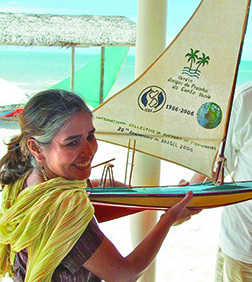Nearly two months ago, Malaysia Airlines flight 370 disappeared from radar after it crossed into Vietnamese airspace between its departure port of Kuala Lumpur, Malaysia, and its intended destination in Beijing.
As other news takes over the 24-hour cycle, hopes of finding the missing airplane also begin to fade, despite the help and involvement of governments from all over the globe.
Chandrika Sharma was one of the 239 people aboard the plane. In our June issue, author Paul Molyneaux profiles the executive secretary of the International Collective in Support of Fishworkers, who spent her career fighting for the rights of small-scale fishermen and the women who help sustain small fishing villages.
This struggle to maintain small fishing ports is nothing new in American fisheries. In late February, Congress approved a $75 million aid package in disaster relief funds, which was half of what proponents had requested. The aid will be distributed primarily to Alaska communities hit hard by a downturn in king salmon returns, Mississippi oystermen and groundfish fishermen all over New England.
Yes, these communities are relieved to receive some funds for their federally declared disasters. However, if you ask fishermen what they really want, it’s to keep fishing, not to survive on government funding. New gear could help some New England groundfishermen survive by helping them save money on fuel and reduce bycatch. Unfortunately, the Gearnet project that has been promoting research and experimentation with semipelagic trawl doors will not continue to be funded through fishery research grants. Find out more in Steve Eayrs’ Dock Talk on page 9 of our latest issue about how the project’s leaders intend to leave a very practical legacy that fishermen take advantage of.
Though the state of American fisheries is generally positive, we cannot ignore the plight of those who are struggling to survive. Individual fishing quotas have been praised as a solution for bringing back overfished populations, but they do not work that way across the board. Catch shares programs are causing New England and West Coast trawlers to face many hardships, both predicted and otherwise.
In many cases, IFQs do more collateral damage in fishing communities than any fishery management program we’ve ever seen because they privatize the public resource, putting all the advantages of a successful fishery in the hands of a few shareholders.
This is exactly the kind of wealth disparity and exclusionary management that Sharma was fighting.
The loss of a leader like Sharma could be devastating to the people she represented on the global political stage. Her colleagues believe she had no equal in terms of passion and the ability to persuade. How can we continue her legacy? By fighting to keep small fishing ports alive and thriving. We have the potential the lead the way for fishing villages in developing nations across the globe. I have no doubt that we can find more creative and constructive solutions than simply selling out to a privatized, Walmart-style approach to fisheries.
Photo: Chandrika Sharma celebrates the 20th anniversary of the International Collective in Support of Fishworkers; ICSF







